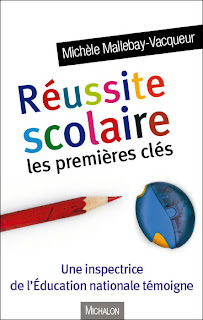Academic failure seemed a specter that haunts our increasingly minds and causes seizures anxiety that we are trying to appease by many publications. Scans each, pick up its proposals, its solutions. There's no denying, books, articles, reports on this topic abound. And this book then, is it "yet another lament or another scathing attack or pamphlet on the subject as hackneyed? " (p. 15) Why this book? What is the point? What distinguishes it from others?
Well, first he presents things differently: the Instead of fighting against failure, Michele Mallebay Vacqueur-speaking academic achievement, as indicated by the title of the book. This is for her to propose " the keys to effective school work and rewarding " (p. 22). This is going upstream, starting very early to put the course for success, being very young age " the outright purchase " (p. 101)
This success depends on many things, some as crucial learning the gesture of writing that " must become so automated that we do even more aware and we naturally take paper and pen according to our needs and our desires . (P. 29), learning to read, the multiple learning theories are not used: synthetic methods, syllabic or alphabetic, analytical or global ... What is certain is that many students arrive at college without really knowing how to read, students who guess the words rather than read them. It is clear that the author Calls for the abandonment of the overall methodology, responsible for this avalanche of readers who do not master the written code.
Other success factors may also include time management, management of media (books, workbooks, exercise files ...) At this point, Michele Mallebay Vacqueur-sounding the alarm against the heavy use or abuse of photocopies, which do not gain that much time, besides the dual use of paper (photocopies are often glued on one page specifications or on a sheet) serving the planet.
Also, reading that book is facilitated, indeed enhanced by the epigraphs at the beginning of each chapter, which shows the spirit of it. For example this quote by Albert Einstein in the beginning of chapter devoted to learning to read:
" Theory is when you know everything and nothing works. The practice, c ' is when everything works and nobody knows why. Here we have assembled theory and practice: nothing works ... and no one knows why ! " (P. 41)
Or this other quote from Leonardo da Vinci, through which the author expresses the need to master the tools of learning: " Details make perfection and perfection is no detail ." (P. 75)
epigraphs addition, there are also images, comparisons that make reading of this essay pleasant and informative. See, eg page 27: " Nobody ever managed to grow a flower and pulling. There is a time for everything, which means that there are both steps to respect and sense of order them. "
Finally, the book is rich with many examples and anecdotes, drawn from the experience of the author, inspector of National Education since 1984. The book is aimed at both parents that 'teachers, and the key message it wants to convey to each other is to stop criminalizing child, to make them bear any responsibility for their failure, we also teachers and parents have our share of responsibility, and I can not Resita the urge to share with you a passage that particularly caught my attention:
Like everyone else, I hear the testimonies of teachers at wit's end, especially in colleges and high schools where one is often faced with difficult youth and stressful situations. However, reading the descriptions of these young people who come to class without necessary materials, talking among themselves without worrying about adults trying with varying degrees of success in providing its course, are absent or virtually at will I can defend myself from feeling somewhat amusing that such young people behave perhaps simply with the institution as the institution has behaved with them the first time their schooling.
Whether at school or at home, they were faced with all our "Wait!" ("One minute", "you see I'm busy (e)", "will play / take a book", "arrive", "I'll be right", "I tell you I am "" Yes, it's coming ", etc..) more often than right. However, they reply that we now that they are great, when our turn, we call for their attention? Quite naturally, they all expect us back "which we have no measure stuffed ."
(pages 167-168)
So this is a book full of advice and common sense that parents and teachers can benefit greatly. I read in the program of Critical Mass Babelio.
Michele Mallebay-Vacqueur, Academic achievement, the first Key , testimony of an inspector of National Education, Michalon Publishing, July 2010, 220 pages, 17 €.

0 comments:
Post a Comment